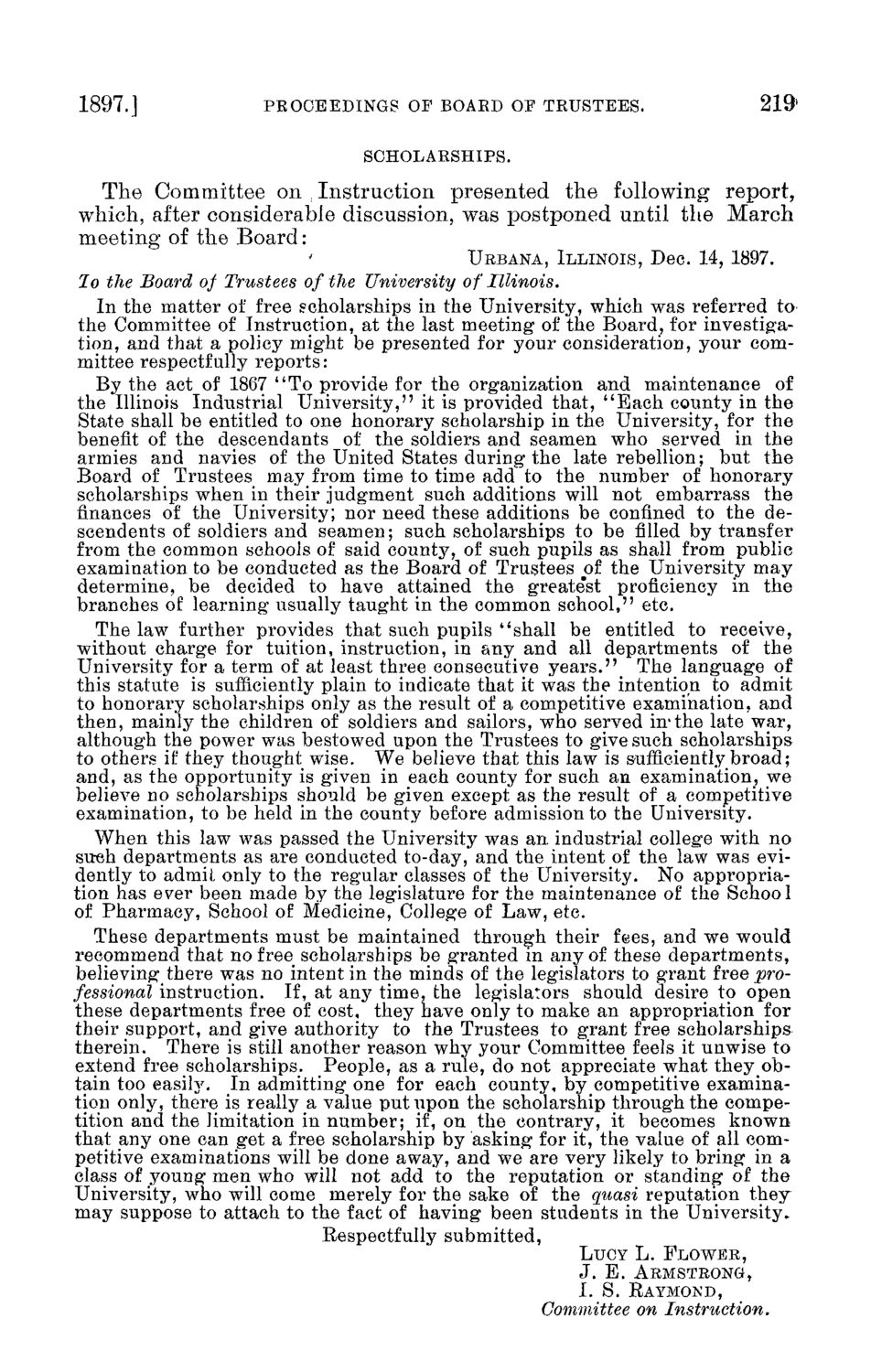| |
| |
Caption: Board of Trustees Minutes - 1898
This is a reduced-resolution page image for fast online browsing.

EXTRACTED TEXT FROM PAGE:
1897.] PROCEEDINGS OF BOARD OF TRUSTEES. SCHOLARSHIPS. 219! T h e Committee on , I n s t r u c t i o n p r e s e n t e d t h e following report, which, after considerable discussion, was postponed u n t i l t h e M a r c h m e e t i n g of t h e B o a r d : URBANA, ILLINOIS, Dec. 14, 1897. lo the Board of Trustees of the University of Illinois, In the matter of free scholarships in the University, which was referred to the Committee of Instruction, at the last meeting of the Board, for investigation, and that a policy might be presented for your consideration, your committee respectfully reports: By the act of 1867 "To provide for the organization and maintenance of the Illinois Industrial University," it is provided that, "Each county in the State shall be entitled to one honorary scholarship in the University, for the benefit of the descendants of the soldiers and seamen who served in the armies and navies of the United States during the late rebellion; but the Board of Trustees may from time to time add to the number of honorary scholarships when in their judgment such additions will not embarrass the finances of the University; nor need these additions be confined to the descendents of soldiers and seamen; such scholarships to be filled by transfer from the common schools of said county, of such pupils as shall from public examination to be conducted as the Board of Trustees of the University may determine, be decided to have attained the greatest proficiency in the branches of learning usually taught in the common school," etc. The law further provides that such pupils "shall be entitled to receive, without charge for tuition, instruction, in any and all departments of the University for a term of at least three consecutive years." The language of this statute is sufficiently plain to indicate that it was the intention to admit to honorary scholarships only as the result of a competitive examination, and then, mainly the children of soldiers and sailors, who served in 4 the late war, although the power was bestowed upon the Trustees to give such scholarships to others if they thought wise. We believe that this law is s-uificientlybroad; and, as the opportunity is given in each county for such an examination, we believe no scholarships should be given except as the result of a competitive examination, to be held in the county before admission to the University. When this law was passed the University was an industrial college with no such departments as are conducted to-day, and the intent of the law was evidently to admit only to the regular classes of the University. No appropriation has ever been made by the legislature for the maintenance of the School of Pharmacy, School of Medicine, College of Law, etc. These departments must be maintained through their fees, and we would recommend that no free scholarships be granted in any of these departments, believing there was no intent in the minds of the legislators to grant free professional instruction. If, at any time, the legislators should desire to open these departments free of cost, they have only to make an appropriation for their support, and give authority to the Trustees to grant free scholarships therein. There is still another reason why your Committee feels it unwise to extend free scholarships. People, as a rule, do not appreciate what they obtain too easily. In admitting one for each county, by competitive examination only, there is really a value put upon the scholarship through the competition and the limitation in number; if, on the contrary, it becomes known that any one can get a free scholarship by asking for it, the value of all competitive examinations will be done away, and we are very likely to bring in a class of young men who will not add to the reputation or standing of the University, who will come merely for the sake of the quasi reputation they may suppose to attach to the fact of having been students in the University. Respectfully submitted, LUCY L. FLOWER, J. E. ARMSTRONG, I. S. RAYMOND, Committee on Instruction.
| |